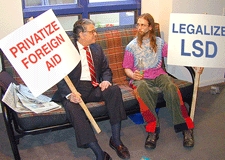Back in 2000 The Onion made fun of Libertarians and published this nugget:

Joking aside, a powerful idea attracts a wide range of people. Copyleft is such an idea. It turns copyright on its head by using authorship rights to enforce the public’s ability to distribute, modify and use the copyrighted work, rather than to curb it as is normally the case. Several copyleft licenses exist, the most prominent in software being the GPL, first released by Richard Stallman in 1989.
There are two main factions supporting the GPL: the pragmatic camp of Linus Torvalds and the ideological camp of Richard Stallman. The Linus camp sees copyleft as the enabler of a superior way to produce software, in which distributed and open development takes place because people are encouraged and protected by the license. The individual programmer is assured that their contributions must always remain a public good and cannot be coopted for private gain. Others may profit from the software, sell it, or support it, but the source code must be available, modifiable and distributable. This is a powerful motivator, the same force that makes people help the Wikipedia but not for-profit outfits.
For large-scale development involving multiple corporations, copyleft solves a type of free rider problem by ensuring that all participants must give back to the common pool of development. This protects investments and tends to boost returns, and a brief look at the Linux Kernel Mailing List shows that major tech companies are happy to play along. I bet you can do some game theory and prove some results for cooperation under GPL.
To the Linus camp the GPL is a means to foster this ecosystem, the end being better software. There are no moral imperatives or political reasons behind the whole thing, which surprises some people. Proprietary software is “alchemy” while open source is science. Here’s Linus:
In my book, what matters is what you do – whether you want to sell things is your personal choice, but even more importantly it is not a moral negative or positive. I’m a big believer in open source as creating good stuff, but I don’t think it’s a moral issue. It’s engineering.
So I think open source tends to become technically better over time (but it does take time), but I don’t think it’s a moral imperative. I do open source because it’s fun, and because I think it makes sense in the long run.
And here’s more:
Just to explain the fundamental issue: To me, the GPL really boils down to “I give out code, I want you to do the same.” The thing that makes me not want to use the GPLv3 in its current form is that it really tries to move more toward the “software freedom” goals. For example, the GPLv2 in no way limits your use of the software. If you’re a mad scientist, you can use GPLv2′d software for your evil plans to take over the world (“Sharks with lasers on their heads!!”), and the GPLv2 just says that you have to give source code back. And that’s OK by me. I like sharks with lasers. I just want the mad scientists of the world to pay me back in kind. I made source code available to them, they have to make their changes to it available to me. After that, they can fry me with their shark-mounted lasers all they want. This is where the GPLv3 diverges. It limits how you can use the software.
The Stallman camp, however, sees GPL-licensed software as the end itself. They claim that software should be free on moral grounds, citing several reasons. Hence it matters not whether the software or the process are superior. One must use free software regardless because it is the right thing to do, while proprietary software is inherently immoral. Here’s Stallman:
Supporters of open source (which I am not) promote a “development model” in which users participate in development, claiming that this typically makes software “better” — and when they say “better”, they mean that only in a technical sense. By using the term that way, implicitly, they say that only practical convenience matters — not your freedom.
I don’t say they are wrong, but they are missing the point. If you neglect the values of freedom and social solidarity, and appreciate only powerful reliable software, you are making a terrible mistake.
The fact that Torvalds says “open source” instead of “free software” shows where he is coming from. I wrote the GNU GPL to defend freedom for all users of all versions of a program. I developed version 3 to do that job better and protect against new threats. Torvalds says he rejects this goal; that’s probably why he doesn’t appreciate GPL version 3. I respect his right to express his views, even though I think they are foolish. However, if you don’t want to lose your freedom, you had better not follow him.
Discussions of copyleft often blur these two camps. For much development this is irrelevant – the license stands on its own irrespective of people’s motivations. But this schism explains periodical battles like the GPLv3 controversy, the endless flames when a proprietary source control tool was used for the kernel, and the GNU/Linux naming controversy. The distinction is also important when thinking about free/open source software and what to make of it.